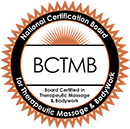Lymphedema Clinic at Brynwood Myofascial Therapy

William Hellyer, MBA, OTR/L, CLT
Lymphedema is an accumulation of fluid that causes swelling in an extremity or sometimes head and neck. The swelling occurs when the lymphatic systems becomes altered by surgery, radiation, chemotherapy and other cancer treatments.
It is estimated that about a third of women who undergo axillary lymph node dissection during breast cancer treatment will develop this disease. This abnormal buildup of fluid can cause swelling, pain, discomfort, and feelings of tightness in specific areas of the body or, more generally, throughout the body itself.
Symptoms of lymphedema may include any or all of the following:
• Swelling in the arms, hands, fingers, legs, feet, toes, face/neck, shoulders and abdomen
• Skin indentations that may stay after being pressed (early onset)
• Weakness or heaviness of legs and arms
• Tightness or stiffness of the skin, pain/heat and/or redness of affected areas
• Aching in the neck, shoulders, spine, or hips
• Decreased range of motion in upper and/or lower extremities
• Difficulty fitting into clothing, tight fitting rings, shoes, or watches.
What is the Lymphatic System?
The lymphatic system plays an integral part in the body’s immune system. It consists of specialized vessels and nodes which help to transport lymph fluid back towards the heart after helping to cleanse the body of metabolic and cellular debris. Lymphedema can be caused by multiple attributing sequelae (an abnormal condition resulting from a previous disease) in the body including:
• Cancer that causes a blockage in the lymphatic drain system
• Surgery (removal of lymph nodes) and/or radiation that affect nodes or vessels
• Infection or physical damage to lymph system or nodes
• Scarring in and around vessels/nodes
• Blockage of a vein by clotting, trauma, or other diseases.
Typical cancers that bring on an increased incidence of lymphedema include, but are not limited to, breast cancer, prostate cancer, melanoma, gynecological cancers, lymphomas, blood cancers, and sarcomas. If left untreated, the accumulation of fluid eventually results in fibrosis (hardening) of the extremity tissues.
How Does Decongestive Therapy Help?
The goal of treating lymphedema is to allow the lymphatic system to flow freely once again- this approach is called Decongestive Therapy. The Brynwood Myofascial Therapy clinic focuses on using a holistic Decongestive Therapy model that includes: education, exercise, manual lymphatic techniques, compression/garments, nutrition/wellness counseling, and skin care/hygiene, as well as assisting with activities of daily living through compensatory means, if needed.
Patient therapy plans are individually designed with these overall goals in mind: reduction in fluid in a safe manner; pain reduction; improved skin pliability, range-of-motion, and self-confidence; and, a return to a normal lifestyle. Providers at Brynwood Myofascial Therapy use current, evidence-based research and continuing education to improve the treatments that our patients receive.
William Hellyer, MBA, OTR/L, CLT
Board Certified Occupational Therapist
Certified in Lymphedema Treatment from the University of Wisconsin Milwaukee
Over 20 years clinical experience, including Myofascial Release Therapy and Craniosacral Therapy
Lymphedema Clinic at Brynwood Myofascial Therapy.pdf
The buildup of tissue fluid (lymph) in the lymphatic system – Lymphedema – can lead to chronic inflammation, infection of surrounding tissue, hardening of skin that results in further lymph damage and distortion of body shape and flow restriction.
Brynwood Myofascial’s Certified Lymphedema Therapist has over 135 hours of specific training for Lymphedema Management. A specific plan of treatment is individually developed that may use any combination of available therapies for complete decongestive therapy:
- Manual Lymph Drainage
- Bandaging
- Compression Garments
- Exercise
- Diet/Nutrition
- Skin Care/Hygiene Tasks
Schedule an initial consultation to address your Lymphedema today.
Brynwood Myofascial accepts most major health insurance programs and Medicare. Each appointment is hands-on, one-on-one with a therapist in a private treatment room.
![]()




